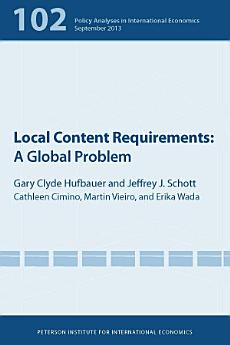Local Content Requirements: A Global Problem
Okt 2013 · Columbia University Press
e-Buku
212
Halaman
family_home
Layak
info
reportRating dan ulasan tidak disahkan Ketahui Lebih Lanjut
Perihal e-buku ini
In the wake of the Great Recession of 2008–09, economists feared that protectionist policies might sweep the world economy, echoing the wave of tariff escalations during the Great Depression of the 1930s. To some surprise, officials were more restrained and largely avoided traditional forms of protection (tariffs and quotas). As a result, economists underestimated the incidence of new protectionism because policymakers increasingly turned to more opaque behind-the-border nontariff barriers (NTBs).
Using a combination of statistical analysis and case studies, the authors show that local content requirements (LCRs), a form of NTB, have become increasingly popular. How much was global trade actually reduced on account of LCRs? A conservative estimate might be $93 billion. Case studies featured cover the healthcare sector in Brazil, wind turbines in Canada, the automobile industry in China, solar cells and modules in India, oil and gas in Nigeria, and "Buy American" restrictions on government procurement.
Using a combination of statistical analysis and case studies, the authors show that local content requirements (LCRs), a form of NTB, have become increasingly popular. How much was global trade actually reduced on account of LCRs? A conservative estimate might be $93 billion. Case studies featured cover the healthcare sector in Brazil, wind turbines in Canada, the automobile industry in China, solar cells and modules in India, oil and gas in Nigeria, and "Buy American" restrictions on government procurement.
Perihal pengarang
Gary Clyde Hufbauer, Reginald Jones Senior Fellow since 1992, was formerly the Maurice Greenberg Chair and Director of Studies at the Council on Foreign Relations (1996–98), the Marcus Wallenberg Professor of International Finance Diplomacy at Georgetown University (1985–92), senior fellow at the Institute (1981–85), deputy director of the International Law Institute at Georgetown University (1979–81); deputy assistant secretary for international trade and investment policy of the US Treasury (1977–79); and director of the international tax staff at the Treasury (1974–76).
Jeffrey J. Schott joined the Peterson Institute for International Economics in 1983 and is a senior fellow working on international trade policy and economic sanctions. During his tenure at the Institute, Schott was also a visiting lecturer at Princeton University (1994) and an adjunct professor at Georgetown University (1986–88). He was a senior associate at the Carnegie Endowment for International Peace (1982–83) and an official of the US Treasury Department (1974–82) in international trade and energy policy. During the Tokyo Round of multilateral trade negotiations, he was a member of the US delegation that negotiated the GATT Subsidies Code. Since January 2003, he has been a member of the Trade and Environment Policy Advisory Committee of the US government. He is also a member of the State Department's Advisory Committee on International Economic Policy.
Cathleen Cimino-Isaacs, research associate, has been with the Peterson Institute since August 2012. She works with Senior Fellows Gary Clyde Hufbauer and Jeffrey J. Schott on economic issues relating to international trade policy, free trade agreement negotiations, and the future of the World Trade Organization.
Martin Vieiro was a research analyst with the Peterson Institute from June 2011 to March 2013. He worked with Senior Fellows Gary Clyde Hufbauer and Jeffrey J. Schott. His research focused on international trade, economic development, and the future of the World Trade Organization.
Erika Wada, former visiting fellow at the Peterson Institute, is a PhD candidate at Michigan State University. She is coauthor of The Benefits of Price Convergence: Speculative Calculations (2002) and coeditor of Unfinished Business: Telecommunications after the Uruguay Round (1997).
Jeffrey J. Schott joined the Peterson Institute for International Economics in 1983 and is a senior fellow working on international trade policy and economic sanctions. During his tenure at the Institute, Schott was also a visiting lecturer at Princeton University (1994) and an adjunct professor at Georgetown University (1986–88). He was a senior associate at the Carnegie Endowment for International Peace (1982–83) and an official of the US Treasury Department (1974–82) in international trade and energy policy. During the Tokyo Round of multilateral trade negotiations, he was a member of the US delegation that negotiated the GATT Subsidies Code. Since January 2003, he has been a member of the Trade and Environment Policy Advisory Committee of the US government. He is also a member of the State Department's Advisory Committee on International Economic Policy.
Cathleen Cimino-Isaacs, research associate, has been with the Peterson Institute since August 2012. She works with Senior Fellows Gary Clyde Hufbauer and Jeffrey J. Schott on economic issues relating to international trade policy, free trade agreement negotiations, and the future of the World Trade Organization.
Martin Vieiro was a research analyst with the Peterson Institute from June 2011 to March 2013. He worked with Senior Fellows Gary Clyde Hufbauer and Jeffrey J. Schott. His research focused on international trade, economic development, and the future of the World Trade Organization.
Erika Wada, former visiting fellow at the Peterson Institute, is a PhD candidate at Michigan State University. She is coauthor of The Benefits of Price Convergence: Speculative Calculations (2002) and coeditor of Unfinished Business: Telecommunications after the Uruguay Round (1997).
Berikan rating untuk e-Buku ini
Beritahu kami pendapat anda.
Maklumat pembacaan
Telefon pintar dan tablet
Pasang apl Google Play Books untuk Android dan iPad/iPhone. Apl ini menyegerak secara automatik dengan akaun anda dan membenarkan anda membaca di dalam atau luar talian, walau di mana jua anda berada.
Komputer riba dan komputer
Anda boleh mendengar buku audio yang dibeli di Google Play menggunakan penyemak imbas web komputer anda.
eReader dan peranti lain
Untuk membaca pada peranti e-dakwat seperti Kobo eReaders, anda perlu memuat turun fail dan memindahkan fail itu ke peranti anda. Sila ikut arahan Pusat Bantuan yang terperinci untuk memindahkan fail ke e-Pembaca yang disokong.





